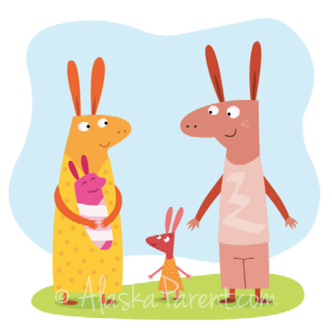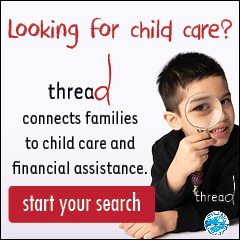
BIG, meet little
Preparing older kids for the new arrival
By Jamey Bradbury
Bringing home a new baby the second time is a big adjustment for you – and your first born. Oftentimes, older siblings are reluctant to share the spotlight with a new baby and will act out once baby arrives. Here are some ways to help smooth your little one’s transition from only child to big brother or sister.
breaking the news
Hold off on telling younger kids a baby is on the way, says certified parent coach Alice Hanscam of Denali Parent Coaching. “Wait until a month or so before the baby’s born. ‘You’re going to have a baby sister’ means nothing to a 3-year-old five months in advance. But when mom’s belly looks bigger, and her lap is getting smaller, you can tell a toddler, ‘You’re going to be a big brother.’ ”
For preschool and older kids, a little lead time will help them adjust. Find an age-appropriate book to help you introduce the topic. “You also can talk about the biology and where the baby comes from, if you’re comfortable with that and depending on the age,” says Pam Webb, a parent educator at Providence Alaska Medical Center in Anchorage. “Talk about the baby growing inside your belly, and let them feel it move.”
baby steps
“Think ahead about how the baby is going to impact the house,” advises Hanscam, who prepared her own 3-year-old daughter to relocate from the nursery months in advance. “We made a big deal about her getting a ‘big girl’ room. Then she moved into her room long before we even put a crib in the nursery – which, by that time, was a totally separate issue from her switching rooms.”
The same goes for personnel changes, says Webb. “If mom has been the primary one doing bed and bath times, start transitioning your partner to take over those activities early on, so it’s not a sudden shift once the baby arrives.”
all parts (of the family) included
Even the youngest kids can pull a bag of diapers off the shelf at the store or help fold onesies. You can even enroll older children in a one-day sibling class like the one offered by Providence. “We show kids what they can do to be helpful, how to be safe around the baby,” Webb explains. “We take them through the hospital, too, so they can see where mom will be when the baby comes.”
Kids also bring a doll or stuffed animal to class to practice holding the baby. Hanscam suggests you keep the same doll on-hand after the baby is born so your older child can mimic what you do when you’re changing a diaper or preparing a bottle.
“The more an older sibling feels included,” she says, “the less acting out you’ll get.”
attention must be paid
“Toddlers are used to having that one-on-one time with you,” Webb says, so after the baby comes home, it’s important to pay attention to them, too.
If you’re breastfeeding, for instance, keep picture books nearby and ask your toddler to turn the pages as you read to him. When her older daughter became a sister, Hanscam made sure to have healthy foods ready and accessible. “While I was occupied with the baby, she was empowered to choose her own snack.”
“Even with a baby in your arms, you can give that one-on-one time,” Hanscam adds. Or, offers Webb, “Wearing your baby allows you to keep her close but also have your hands free to play with your preschooler.”
problem-solving
Sharing the spotlight is hard; no matter what you do, your older child may still struggle. “They might hit or push the baby away from mom, or act out toward a family pet,” says Hanscam. “They’re trying to process their feelings the only way they know how.”
Some siblings regress: Those who were potty trained might start wetting the bed again. Don’t make a big deal about it,” says Webb. “Reversion like that usually goes away pretty quickly if you’re not reinforcing it.”
It’s important to acknowledge your child’s feelings, carve out times when you can focus solely on them and remember it’s just temporary, says Hanscam. After all, she adds, “Sibling relationships don’t just happen; they evolve over years.”









